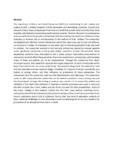An investigation into the factors influencing the graduation of women-owned micro-enterprises: A survey of women-owned micro-enterprises in Nyeri Town - Kenya

View/
Date
2012-04Author
Karanja, Tabitha W.
Kimani, G.
Kiama, M.
Metadata
Show full item recordAbstract
The importance of Micro and Small Enterprises (MSEs) in contributing to job creation and output growth is widely accepted in both developed and developing countries, of particular interest is the process of expansion from micro to small that growth oriented make their most tangible contribution to economic growth and job creation. Women-Owned micro enterprises are a powerful force for growth and development thus making important contributions to the economy as workers and as entrepreneurs to the welfare of their families. The researcher investigated why Women-owned enterprises remain the same way year in year out without, an increase in number of employees or any other sign to indicate graduation from one level to another. The researcher wanted to find out why enterprises owned by women operate under significant constraints which greatly inhibit realization of their full potential. Many developing countries have attempted to put in place various intervention programmes to address factors that affect the graduation of women owned micro-enterprises; unfortunately many of them are policies yet to be implemented. Through the assistance from Nyeri municipal-council, the researcher acquired the target population of Micro-Enterprises within Nyeri town which was the survey under study. The research design that the researcher used was the descriptive survey research design. Variables, for instance financial accessibility was looked at among others and their influence on graduation of micro-enterprises. The instruments that the researcher used was the Questionnaire and Interviews. The researcher came up with comprehensive results that can be useful to women in micro-enterprises and the Government at large. Pre-testing procedure was carried out to ensure the validity and reliability of the data to be collected. A descriptive statistic procedure was used to carry out the data analysis. Bar-charts, tables and pie-charts are used for data presentation. Some of the major findings in this research include the fact that many women operating micro-enterprises started their enterprises with personal savings as they could not access loans from formal institutions due to lack of collateral- Due to their low level of education, majority of them exhibited challenges in record keeping as well as marketing which are very essential for graduation of an enterprise from micro to small.
